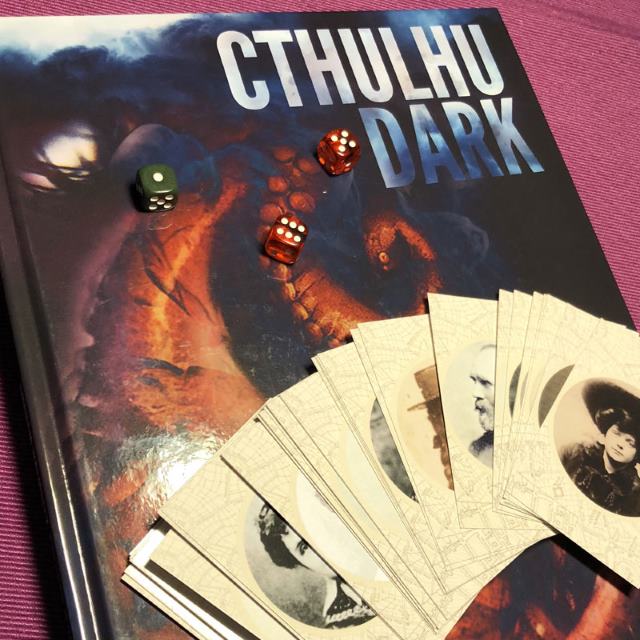Role-playing games (RPGs) have long been celebrated for their ability to immerse players in rich narratives and challenging scenarios. Beyond their entertainment value, RPGs can also serve as powerful tools for learning and personal development. It is my aim to create a roleplaying game that can help facilitate powerful learning experiences. I have set out a series of principles that I consider critical to playing the game in this context.
In this article, I look at two rulesets that I think can be used in developing a learning RPG where player decision making is key. I believe that Cthulhu Dark and Those Dark Places, can be effectively harnessed into a ruleset for a learning-focused RPG experience.
Cthulhu Dark
Cthulhu Dark, designed by Graham Walmsley, is a minimalist RPG system that thrives on atmospheric horror and player-driven storytelling. While the game is known for its Lovecraftian themes, its simplicity and focus on narrative make it a versatile tool for educational settings. The core mechanic revolves around rolling one to three six-sided dice to determine success or failure. Additionally, characters have only one stat. This streamlined approach encourages players to immerse themselves in the story, fostering creative thinking and collaborative problem-solving skills.
This game has a brilliant insight mechanic. As characters are exposed to the horrors of the scenario it slowly builds. Until the characters have seen too much and break. While this works really well for the horror theme it may need alteration when developing a learning RPG. Changing it from insight to exhaustion would allow you to cover a wider variety of genres and scenarios.
You can read a more in depth review of this fantastic game here.

Those Dark Places
Those Dark Places, created by Jonathan Hicks, is a science fiction RPG system that invites players to explore the mysteries of the cosmos. My favourite movie of all time, Alien is a core inspiration here. It emphasizes the survival of a team in an unforgiving environment, fostering teamwork, critical thinking, and decision-making skills. By presenting players with complex challenges and dilemmas, Those Dark Places prompts them to weigh the consequences of their choices, fostering a deep sense of responsibility and strategic thinking.
Of course, the game system is also very rules-lite. Utilizing six sided dice over four attributes. It also has a great stress mechanic that builds over time as the characters experience high pressure situations.
You can find a more detailed review of this awesome game here.

Using These Games
Integrating Cthulhu Dark and Those Dark Places into an experiential learning setting yields numerous benefits. Firstly, these games encourage active participation and engagement, fostering a love for learning and exploration. Dice rolling in both games are kept to a minimum. Meaning decision making and player actions have significantly more weight. The collaborative nature of RPGs also promotes teamwork and effective communication skills, as players must work together to overcome obstacles and solve problems. Additionally, neither game has the level/experience constructs of Dungeons & Dragons. The open-ended nature of these systems stimulates creativity and imagination, allowing players to think outside the box and develop innovative solutions.
Use When Developing a Learning RPG
Utilizing Cthulhu Dark and Those Dark Places as learning tools, educators can adapt the game mechanics to suit specific educational goals. For example, scenarios based in reality can be easily reimagined in the Cthulhu Dark system. Focusing on participant decisions and collaboration. Those Dark Places might be more applicable to simulate problem-solving, using skills to solve hypothetical challenges.
Of the two I think that Cthulhu Dark will form the mainstay of my future learning-rpg ruleset. It is highly versatile, focuses on player decision making and ramps up pressure with its insight mechanic. While scenarios will require careful tweaking, the core of the rules will not. Additionally it is the easier to teach players who are completely new to the concept of roleplaying.
Safety and Ethical Considerations
You may have noticed that the two gaming systems chosen both have a horror theme. This is not intentional. Perhaps the horror genre lends itself to more narrative focused gameplay. Of course, it is not my intent to include horror elements into the learning-focused scenarios, instead focusing on more grounded high pressure scenarios.
Remember, when utilizing RPGs as learning tools, it is crucial to establish a safe and inclusive environment for all participants. Emphasize the importance of respect, consent, and cooperation among players. Ensure that sensitive topics are approached with care, and provide opportunities for reflection and discussion after each session to process the emotional impact of the game.
Final Thoughts On Use as a Learning RPG
Cthulhu Dark and Those Dark Places are not only captivating RPG systems for entertainment but also effective tools for fostering learning and personal development. By leveraging their narrative-driven mechanics, we can create engaging and immersive experiences that promote critical thinking, problem-solving, teamwork, and creativity. Both would make a great learning RPG in their own right.
Using these game mechanics we can create unique and exciting ways to engage learners and expand their horizons beyond traditional training methods. Over the coming weeks I intend to pull together a simple ruleset that will let us explore experiential leadership and team learning through the poser of RPGs.




